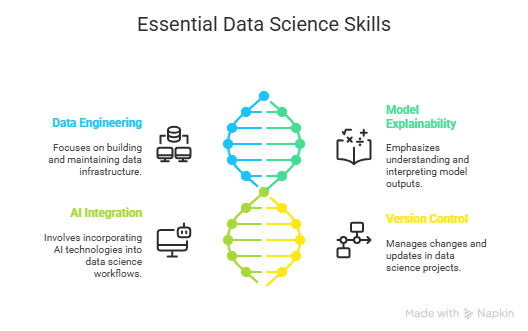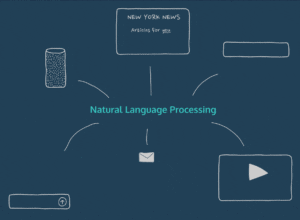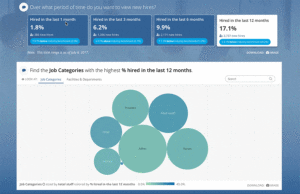Data science skills are business need in the coming age of digital economy. Whether you are current working individual or engineering college student, you have to get appropriate set of in-demand data science skills like any other professional individual so that you can achieve the high-level job in this competitive era. The demand for limited data science talent increases every day, and thus it is one of the future-proof and highest revenue-generating careers across the world.
How Essential Data Science Skills Are?
Companies all over the world are making decisions, predicting trends, and viewing the world as data. That also poses more challenging tasks to skills of a critical nature. Companies are being enabled to do business with information in an improved way by data scientists in a way that organizations become enabled and form new ideas.
Skills Required for Data Scientists
You need to learn technical and soft skills to remain updated with this career. The top skills are:
- Programming Skill: Python, R, SQL skill.
- Data Cleaning and Processing: Data cleaning, processing skill, data handling using libraries like Pandas and NumPy.
- Statistical Analysis: Basic stats, probability, hypothesis testing.
- Machine Learning Basics: Knowledge of ML algorithms and usage of ML.
- Data Visualization: Practical experience in creating dashboards with Power BI, Tableau, or Matplotlib.
- Big Data Technologies: Practical experience in using Hadoop, Spark, or similar technology.
- Communication: Practical experience in presenting findings from deep data to technical business decision-makers.
Technical data science skills are the flavor of the month. Imarticus Learning’s Postgraduate Program in Data Science and Analytics familiarizes you with domain-based learning of subject matter areas such as:
- Python & SQL
- Data Visualisation & Analytics
- Power BI & Tableau
- 25+ business project experience
Business-agnostic, and voila. You’re a master of the key skills of a data scientist.
Must-have Data Science Skills for Beginners
Beginners, you have to know these core skills to start with:
- Python programming basics
- Data wrangling using Pandas
- Chart-based data visualisation basics
- Probability & statistics basics
- SQL database query
Our data science course provides seamless acquisition of these skills via live sessions and guidance.
Data Science Career Key Skills
Hiring managers in data science seek owners of pertinent knowledge to implement in real-world problems. The data science key skills for a data science career are:
- Data storytelling: data insights as stories
- Developing machine learning models
- Business context
- Data problem-solving
- Knowledge of Python, SQL, and data tools
Top Data Science Skills Hired by Recruiters
Practice of top skills recruiters seek:
- Pre-processing & data manipulation
- Application of machine learning
- Model testing & tuning
- Stakeholder management & communication
- Real-world project working experience
Learning Materials to Develop Data Science Skills
Acquisition of core skills includes exposure to quality learning materials. Some of the learning materials which are suggested include:
- Web-based learning portals such as Coursera, Udemy, and Imarticus Learning
- Industry case studies & industry project
- Coding hackathons & coding contests
- Experiential development environments such as Jupyter Notebooks
Why Imarticus Learning?
Our Postgraduate in Data Science and Analytics features:
- 100% Job Guarantee with 10 assured interviews
- Experiential job-focused curriculum
- 25+ experiential projects
- Practice on 10+ data science tools
- Career mentorship by career mentors
- Placement with 2000+ hiring companies
- Industry-approved faculty
Career Prospects After Gaining Data Science Skills
Gaining the right skills can make you a:
- Data Scientist
- Data Analyst
- Business Analyst
- Machine Learning Engineer
- Analytics Manager
- Business Intelligence Specialist
Conclusion
Data science skills is your gateway ticket to a thrilling, future-proofed career. Invest wisely in training, key skills for data science jobs, and mentorship by Imarticus Learning, and you can purchase hot data science skills that will be in hot demand by employers. Up-skilling or fresh graduate, invest in yourself today and be the pioneer of data science professionals.
FAQs
1. What are the key data science skills?
- Python/SQL coding, stats, data analytics, machine learning, and communication.
2. Can a novice learn fundamental data science skills?
- Absolutely! Our course is specially tailored for beginners to develop proficiency right from the ground level.
3. How long before you’re a data science master?
- You can acquire marketable skills and hands-on training with our 6-month duration.
4. Do I need technical skills for data science?
- Technical skills, of course, but business administration and soft skills as well for us.
5. What are the top demanded data science skills of 2024?
- Data wrangling, machine learning, data storytelling, and Python remain in demand even now.
6. How does Imarticus skill up applicants with data science skills of today?
- With live lecture, project, mentorship, and interview assurance.
7. Does technical background remain a necessity for carrying out data science?
- We need no technical background at all. We have a great study course within our program and are even student-focused.
8. Can I complete data science work anywhere on the globe?
- In-demand Data science can be worked upon anywhere in the world, and we do prepare our students to be globally competitive as well.
9. What am I learning to apply in the program?
- Python, SQL, Power BI, Tableau, etc.
10. What is the job guarantee?
- We have 10 interview booking of interviews with 2000+ partners which can get you employed.






 Data presented as contextual stories, rather than isolated data points, makes individuals more likely to understand the impact, decipher patterns and make more informed decisions.
Data presented as contextual stories, rather than isolated data points, makes individuals more likely to understand the impact, decipher patterns and make more informed decisions.